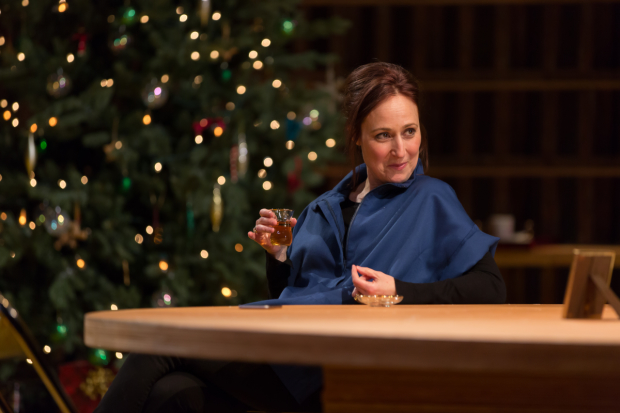Architecting a Life in Noura
The Shakespeare Theatre Company presents reminiscences from Iraqi immigrants.

(© Scott Suchman)
Award-winning playwright and performer Heather Raffo's play Noura is receiving its world premiere at the Shakespeare Theatre Company as part of the Women's Voices Theater Festival. Its central mission is to find a definition of "home" and to determine how important home is to each of us.
Raffo is particularly interested in women's lives and bridging the cultural divide between a Middle Eastern culture that treasures the social fabric of community and an American culture that worships individualism. Noura, a modern retelling of A Doll's House as seen through the lens of Iraqi immigrants, explores that divide and the different meanings of home.
Noura takes place in New York City in the home of Iraqi immigrants Noura and her husband Tareq. As Chaldean Christians, it is a very special time for the couple, who are preparing to celebrate their first Christmas as American citizens. In addition, Noura is anticipating the arrival of a special guest, a young Iraqi refugee named Maryam, who Noura has been sponsoring in Mosul. Maryam was living in an orphanage there until recently, when ISIS burned it down.
While Noura, Maryam, Tareq, their son Yazen, and their best friend Rafa'a are all originally from Mosul, they have much that separates them. Noura and Tareq have totally different views about how they should view their lives in America. As a doctor, he is very happy with his life in New York and cannot understand Noura's anxiety. As an architect, Noura wants to build an extraordinary house, a massive edifice for 43 people. She is much less settled than her husband is. When Maryam finally arrives, she forces the family, including Rafa'a, to look carefully at itself and its expectations.
Heather Raffo is brilliant in the title role and brings a great deal of subtle charm to the part of the intelligent, somewhat rebellious Noura. Her scenes with Gabriel Brumberg, who plays her son Yazen, offer particularly charming and poignant interludes. Nabil Elouahabi is excellent as Tareq. He exhibits irrepressible good humor and portrays the character as a man who does not overthink the meaning of immigration or the fact that he no longer lives within striking distance of ISIS. Matthew David portrays Rafa'a well.
Much of the play's humor is built on an appreciation of irony and the lines that reflect life's irony best seem invariably given to Rafa'a. Also a doctor, he and Tareq are always on the same wavelength: both are quick-witted and ready with a joke. Dahlia Azama makes a lively, energetic Maryam. Although she doesn't turn out to be the quiet, grateful young woman Noura expected, she is ultimately the one who forces Noura to confront her future and decide how to live her life. Azama does that very smoothly.
Director Joanna Settle keeps the humor of the play as present as its intellectual content. Andrew Lieberman's living room set offers a mid-century modern vibe with light-colored wooden tables that line the sides and back of a curved brick wall. Fittingly for an architect, the only furniture is Noura's huge drafting table, which is converted into a dining room table for Christmas dinner. A massive Christmas tree stands stage right, trimmed with white lights and ornaments. Costume designer Tilly Grimes creates a wonderful look for Noura, giving her slender black slacks, blue and cream-colored tunics, and a woolen blanket as a cape. The men and Yazen wear typical modern casual clothes. Maryam has a similarly casual vibe, but her jeans are paired with an army green jacket and a backpack.
Raffo's story incisively mines complicated relationships between men and women, cultures, and personal beliefs. The heart of A Doll's House is cleverly and closely woven into Noura, resulting in an excellent play about immigration, assimilation, and identity.








